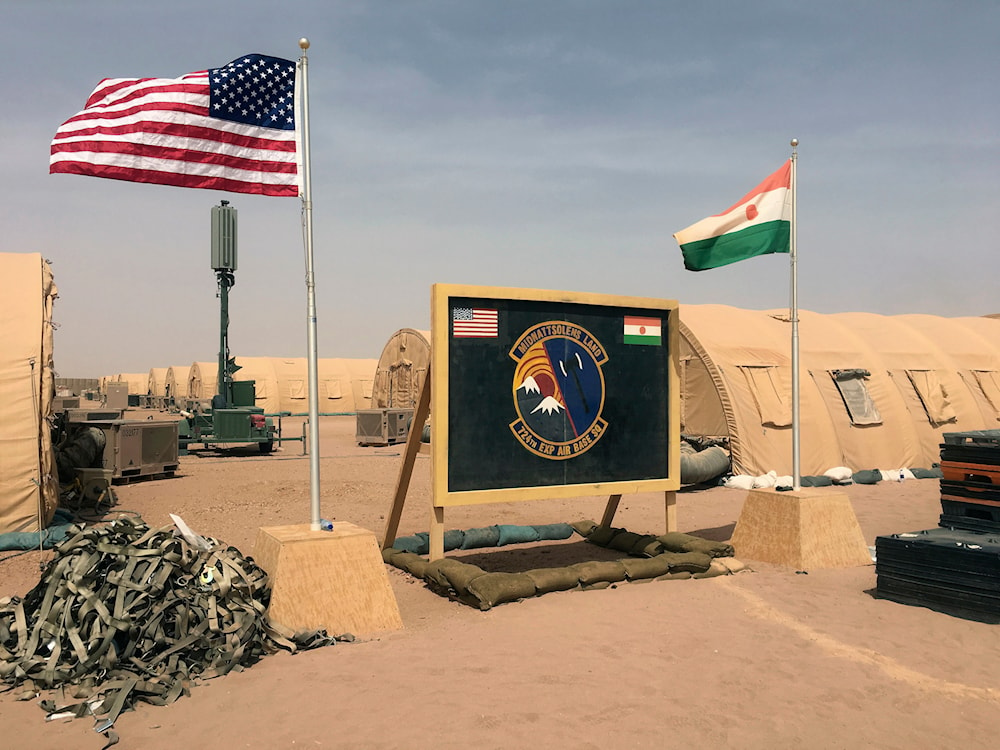75 Army Special Forces personnel to withdraw from Chad this weekend
According to current and former US officials, the letter from Chad, which was reported by CNN, is a negotiating tactic to pressure the US into a more favorable deal before the May elections.
-

April 16, 2018, a US and Niger flag are raised side by side at the base camp for air forces and other personnel supporting the construction of Niger Air Base 201 in Agadez, Niger. (AP)
US officials have confirmed that 75 Army Special Operations personnel operation in Ndjamena, Chad’s capital, will be withdrawn by the Pentagon in the next few days in response to the African governments’ demands.
Chad, alongside Niger which will also witness the withdrawal of around 1,000 troops, wants terms that would serve the hosts' interests. However, US officials express hope to resume talks on security cooperation after elections in Chad on May 6.
The withdrawal decisions come eerily at a time when African nations are drawing closer to Russia.
The impending departure of the US military advisors from Chad, a sprawling desert nation at the crossroads of the continent, was prompted by a letter from the Chadian government this month that the United States saw as a threat to end an important security agreement with Washington.
In a letter sent to the US defense attaché last week, Chadian officials threatened to end the Status of Forces Agreement, or SOFA, which governs the rules and circumstances under which US military forces may operate in the nation. While the letter did not explicitly command the US military to leave Chad, authorities told CNN that it required all US personnel to depart the French facility in N'Djamena.
Two sources explained that the letter identified the US Special Operations Task Force (SOTF) at the site, which serves as a vital hub for US Special Operations Forces in the region. However, the task force is not the sole presence of US military troops at the site; all US service members in Chad are stationed in N'Djamena.
Both sources warned that the letter may be a negotiating technique used by the Chadian administration to get a new deal that better suits their interests, citing it had caught US officials off guard.
Pack-and-go situation
Officials stated that US military personnel in the embassy or in different advisory jobs are not affected by the decision to withdraw.
The letter was sent by Chad’s chief of air staff, Idriss Amine, and was typed in French, according to two US military sources but was not sent through official diplomatic channels.
Joe Biden and Antony Blinken claimed that Niger would be the “centerpiece” of their Africa strategy. Then a coup happened.
— Rep. Matt Gaetz (@RepMattGaetz) April 19, 2024
Now 1100 American troops are stranded in Niger, being denied access to supplies, and at risk of another Benghazi-style attack.
But the State Department has… pic.twitter.com/9rGE3wUfdz
The US officials noted that they are scheduled to start leaving this weekend and complete their departure to Germany by May 1.
Read more: Russian experts in Niger to train forces against terrorism: Sputnik
According to a report last week by The Washington Post, the withdrawal of a contingent of US Special Forces stationed in Chad would represent another setback for Western hegemony in the Sahel region.
In Mali, Burkina Faso, and Niger, successive coups have toppled the governments. These coups have been accompanied by resentment toward France, the former colonial power, and a shift toward Russia and China. That said, the report explains that the current government in Niger has decisively steered the impoverished nation away from Western influence, expelling French troops and moving toward reducing the significant US presence in the country's desert regions.

 3 Min Read
3 Min Read








